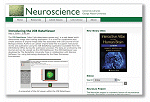2009 Campus Technology Innovators: Portals
- By Mary Grush, Matt Villano
- 08/01/09

GEORGE MASON U's research portals are fostering community between librarians and researchers.
Pictured: project lead Wally Grotophorst and Physical Sciences Liaison Librarian Eileen Chandhoke.
PORTALS
Innovator: George Mason University
Discipline-targeted research portals-- combining database
resources with subject-specific search widgets, blog
postings, and more-- are changing the way Mason's
librarians provide services to researchers and students.
At George Mason University (VA), work began in late 2007
to address one of the recommendations from the GMU President's
Library Task Force: Libraries must do everything they
can to assist both faculty and students to become more productive.
"We took this as a ‘directive' and challenged ourselves
to develop discipline-based research portals for all academic
graduate programs by the end of 2010," says project lead
Wally Grotophorst, associate university librarian, Digital Programs
& Systems.
The first of the research portals was available by mid-2008.
The project is ongoing, with seven portals operational now
and many more planned. Current examples include portals for
Bioinformatics, Global Research
and Education, and Neuroscience.
To create each portal,
developers combine two
open source software
products: WordPress
and CWIS (Collection
Workflow Integration
System) from the University of Wisconsin's Internet Scout
Project. A subject librarian then serves as the curator of his or
her portal, which includes a database of resources with
subject-specific search widgets, blog postings, and other
materials and references. The portal becomes the new primary
point of contact for library users in that particular discipline.
The use of off-the-shelf open source software products was
a particularly important choice for developers. Grotophorst
says that the project is more a matter of systems integration
than software development, pointing out that GMU only had
to write snippets of code to improve the CWIS resource database,
and build a few WordPress widgets to provide additional
specialized services. GMU librarians and portal
developers have been impressed by the versatility of Word-
Press: "Not only does it support the blogging function, but
the widget architecture gives us the opportunity to add useful
and complex services with very little code," Grotophorst
comments.

GMU LIBRARIANS aim to develop discipline-specific portals for all academic graduate programs by the end of 2010.
Benefits of the new portals abound: Faculty and
upper-division researchers now receive a tightly
focused set of services and resources from the library.
Research faculty are more productive because the
tools and services they need are brought together by
the portal. Upper-level undergraduates also find the
portals useful in their work. And librarians have a new
way to interact with faculty and build skills for the
future. What's more, blog and commenting features
help make the portal a useful, timely venue for communication
between faculty and librarians.
Grotophorst stresses that the portals offer a way to
foster community between the liaison librarians and
researchers, a big improvement over static subject
guides previously produced for various topical areas.
"We're reinventing the way librarians interact with faculty,
meeting our audience where they are: on the
web," he boasts. The portals also have a user-friendly interface on the back end, so the librarians can do data entry
and resource maintenance more easily.
The future at the GMU libraries holds not only more subject
portals, but also new features and capabilities. GMU is now
working with federated search specialist Deep Web Technologies
to build tightly focused metasearch systems for each
portal. Each librarian is working with his or her academic
departments to identify five to 10 key resources that each
department would like to combine into a single search box.
For instance, a history search engine for the Early US History
portal retrieves information from the American History & Life,
Historical Abstracts, Arts and Humanities Search, American
Memory Project, JSTOR, OAIster, and WorldCat databases.
Grotophorst notes that GMU is a pioneering academic customer
for Deep Web Technologies, a vendor previously used
chiefly in the business and government sectors.
About the Authors
Mary Grush is Editor and Conference Program Director, Campus Technology.
Matt Villano is senior contributing editor of this publication.